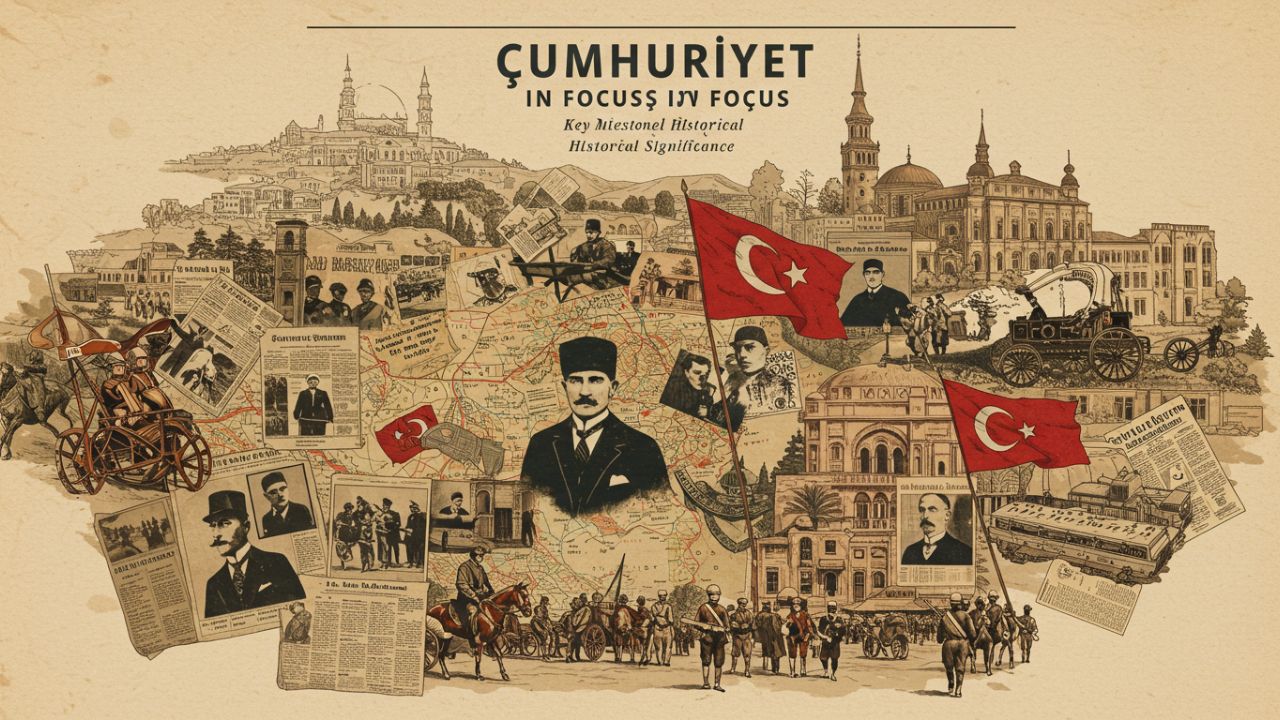Introduction to Cumhuriyet
Cumhuriyet, or the Republic of Turkey, stands as a monumental chapter in the saga of modern nations. It is more than just a political entity; it is a beacon of change and progress that reshaped an entire society. Established in 1923, this bold declaration marked not only the end of centuries-old empires but also heralded a new era filled with possibilities.
Imagine stepping into a world where tradition meets innovation. The founding fathers envisioned a nation characterized by secularism, democracy, and national unity—principles that still resonate deeply today. As we delve into key milestones and historical significance surrounding Cumhuriyet, discover how this transformative period continues to influence Turkish life in various realms: politics, culture, education, and beyond. Buckle up for an insightful journey through history!
Founding of the Republic of Turkey
The founding of the Republic of Turkey in 1923 marked a pivotal moment in history. After centuries under the Ottoman Empire, the nation yearned for change and renewal.
Mustafa Kemal Atatürk emerged as a revolutionary leader during this transformative era. His vision was clear: establish a modern, secular state that embraced democracy.
On October 29, 1923, Turkey officially became a republic with Atatürk as its first president. This shift signaled an end to monarchical rule and opened doors to new possibilities.
The declaration not only altered political structures but also inspired national pride among citizens. It ignited hopes for modernization across various sectors including education, law, and culture.
Atatürk’s leadership set the foundation for numerous reforms aimed at reshaping society. The transition from empire to republic promised fresh perspectives on identity and governance that would influence generations ahead.
Atatürk’s Reforms and Modernization of Cumhuriyet
Atatürk’s vision for Cumhuriyet was transformative. He aimed to create a modern nation-state rooted in secularism and nationalism.
One of his most notable reforms was the adoption of the Latin alphabet, which replaced the Arabic script. This change made literacy more accessible and bridged cultural divides.
He also championed women’s rights, granting them voting rights long before many Western nations. This empowerment reshaped societal norms and roles within Turkish communities.
Education underwent significant reform with new institutions established to promote science and critical thinking. Atatürk believed that knowledge was essential for progress.
Additionally, he restructured legal systems based on European models, promoting equality under the law. The secularization of religious institutions separated state affairs from religious influence, reinforcing progressive values across society.
These reforms laid the groundwork for a forward-looking Türkiye that embraced modernization while honoring its rich heritage.
Impact of Cumhuriyet on Turkish Society and Culture
Cumhuriyet has profoundly transformed Turkish society and culture. It ushered in a new era where secularism became a cornerstone of national identity. This shift allowed for the flourishing of diverse cultural expressions.
Education reforms democratized knowledge, leading to higher literacy rates. Schools emerged across the country, fostering an informed populace eager to embrace modernity. Traditional roles began to evolve as women gained more rights and opportunities, dramatically altering family dynamics.
Art and literature also thrived under Cumhuriyet’s influence. Writers found inspiration in the ideals of freedom and equality, creating a rich tapestry of works that reflect contemporary Turkish life.
Cultural institutions blossomed too—museums, theaters, and galleries emerged as platforms for creative expression. The blend of tradition with modern influences gave rise to unique artistic movements that celebrate Turkey’s heritage while looking towards the future.
These changes ignited a sense of national pride among citizens, unifying them through shared values rooted in progressiveness.
Challenges and Controversies Faced by Cumhuriyet
Cumhuriyet has faced numerous challenges since its inception. One of the most significant issues is the tension between secularism and religious conservatism. This conflict often leads to heated debates about identity and national values.
Ethnic diversity presents another layer of complexity. The Kurdish question, in particular, remains unresolved, creating a rift within society that continues to affect political discourse.
Moreover, political polarization has intensified over the years. Different factions vie for power, resulting in instability and division among citizens.
The media landscape also grapples with censorship and freedom of expression concerns. Journalists face pressure which stifles open dialogue on critical issues affecting Cumhuriyet today.
These controversies illustrate the delicate balance Turkey attempts to maintain as it navigates modernization while honoring its historical roots.
Cumhuriyet Today: Political Landscape and Future Outlook
Today, the Republic of Turkey navigates a complex political landscape shaped by internal and external factors. The legacy of Cumhuriyet continues to influence party dynamics and public sentiment.
In recent years, debates surrounding democracy and secularism have intensified. Citizens are increasingly vocal about their rights and freedoms. This shift reflects a yearning for the original ideals set forth by Atatürk.
Emerging political movements challenge traditional parties. Young voters play a crucial role in this evolution, often prioritizing progressive values over established norms.
Additionally, Turkey’s geopolitical position adds another layer of complexity. Relationships with neighboring countries continue to evolve amid regional tensions and alliances.
Looking ahead, the future outlook is uncertain yet filled with potential. The commitment to democratic principles remains essential for sustaining progress within society. Engaging citizens in meaningful dialogue will be vital for shaping what Cumhuriyet means in contemporary times.
Conclusion: Reflections on the Legacy of Cumhuriyet
The legacy of Cumhuriyet is deeply woven into the fabric of Turkish history. Established in 1923, it marked a transformative period that redefined the nation’s identity. Atatürk’s vision for a secular, modern state laid the groundwork for many aspects of contemporary Turkey.
Today, Cumhuriyet remains a symbol of progress and resilience. The principles set forth by its founders continue to influence political discourse and cultural expressions. Yet, challenges persist as society grapples with balancing tradition and modernization.
As Turkey navigates its path forward, reflections on Cumhuriyet’s foundations serve as reminders of the values that shaped this nation. Its journey illustrates both triumphs and trials—an enduring testament to the spirit of change that characterizes Türkiye today.

